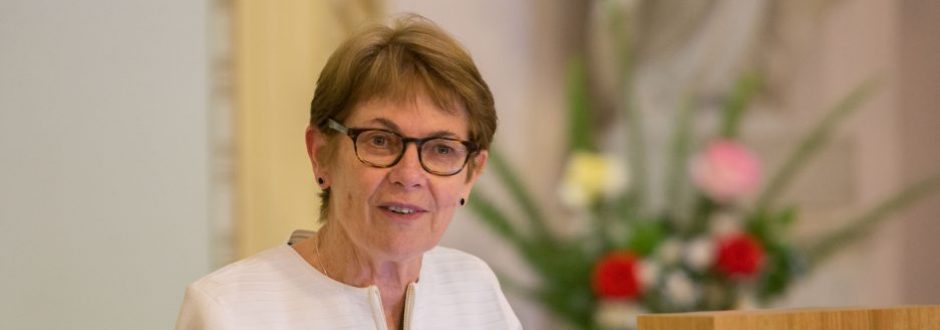All hate speech should be condemned, but it is far easier for me to call out racism than to examine the racism that lurks within my own heart, writes Congregational Leader Sister Patty Fawkner.
Did you know that June 18 was International Day for Countering Hate Speech, one of the most recent additions to the international calendar? First introduced in 2022, the day was established, “In response to the alarming trends of growing xenophobia, racism and intolerance, violent misogyny, antisemitism and anti-Muslim hatred around the world”.
In Australia, we should not be surprised. We have witnessed how one form of hate speech – racially motivated hate speech – has escalated within debate about the Referendum on the Voice to Parliament and in the wake of the experience of ABC journalist, Stan Grant, following his appearance on a panel prior to the coronation of King Charles. Grant, a proud Wiradjuri man, stepped down as host of the ABC’s flagship Q+A program, citing torrents of racist abuse.
The same week that Grant stood down, I was driving a friend who declared, after I was forced to brake suddenly, “I’m not racist, but that person who pushed in front of you was an Asian.” Some would dismiss this as an innocuous example of ‘casual racism’. There is nothing innocuous about it. How many times do we hear the negation of racism, immediately followed by an overtly racist statement?
I’m Not Racist, But … is a poem written 20 years ago by Dr Anita Heiss, an Aboriginal author, poet and social activist. Currently, Dr Heiss is Professor of Communications at the Aboriginal and Torres Strait Islander Studies Unit at the University of Queensland.
Some telling lines from her poem are:
“I’m not racist, but why can’t I climb Ayers Rock?
I’m not racist, but why do I have to say sorry for something I didn’t do?
I’m not racist, but they’re all drunks.
I’m not racist, but I wouldn’t want my daughter to marry one.”
And on it goes.
Racism universalises, generalises, stereotypes and demeans.
It occurs to me that it is far, far easier for me to call out racism than to examine the racism that lurks within my own heart.
“Are you racist?” Of course not.
Pauline Hanson, who claims she’s not racist, said, among other egregious statements, that “Islam is a disease; we need to vaccinate ourselves against that”. Few of us would openly admit to holding racist beliefs, but social psychologists tell us that most of us do. This is due to the fact that we hold ‘implicit biases’ which are attitudes, prejudices, and judgments that we unconsciously hold about people or groups.
By definition, we are unaware of such attitudes, but they leach out in our words, our actions and feelings. I don’t believe that I have been guilty of hate speech, but I am shamefaced to admit that as a young woman I climbed Uluru. I recall being on a bus in Washington, DC many years ago and feeling nervous and uncomfortable because I was the only white person on the bus. I’ve laughed heartily at ethnic jokes.
Perhaps we’re all racist to some degree. We do not live in a binary world. Racism exists on a spectrum, from subconscious lingering stereotypes, through casual racism, to Pauline Hanson-like comments and full-blown malicious soul-and-body-destroying racism.
Social media has become the weapon of choice for stoking racist talk.
It’s been described as a “cauldron of hate” where “people are boiled alive in words designed to destroy”. I believe that during the referendum debate we have already witnessed how some media and political commentary and dog-whistling discourse has fueled social media venom.
But there are signs of hope, and the International Day for Countering Hate Speech wants us to name them. The purpose of any International Day is not only “to educate the general public on issues of concern, to mobilise political will and resources to address global problems.” Equally, it aims “to celebrate and reinforce achievements of humanity.”
Perhaps some small signs of hope are those who are saying, enough is enough. Journalists such as Stan Grant, public figures such as his boss, ABC Chair Ita Buttrose, and politicians such as Chris Minns and Dominic Perrottet during the recent New South Wales election are calling for more civil and respectful discourse.
We can learn much from those who have been the victims of racial abuse.
I was moved by Stan Grant’s gracious words as he signed off on his, for now, final Q+A appearance. Grant said that his culture had taught and conditioned him to respond to racial abuse by calling upon “Yindyamarra”, a word meaning strength in silence, kindness and respect.
I continue to be deeply moved by the wording of the Uluru Statement from the Heart, which concludes: “In 1967 we were counted, in 2017 we seek to be heard. We leave base camp and start our trek across this vast country. We invite you to walk with us in a movement of the Australian people for a better future.” Invitational, gracious and generous words which aim to build up and unite, rather than words which tear down and divide.
Words matter.
I am reminded of a few words written some 1500 years ago by St Benedict in his famous Rule. Benedict asks, “Is there anyone here who desires life and longs to see good days?” Seriously, who would ever say “No” or “Pass”? Benedict not only asks the question; he also shows the way. “If you desire true and lasting life, keep your tongue from evil and your lips from speaking deceit; avoid evil and do good, seek peace and pursue it.”
The International Day for Countering Hate Speech knows, the Uluru Statement knows, Stan Grant knows, as St Benedict knows, words can kill, and words can give life. Words matter.
